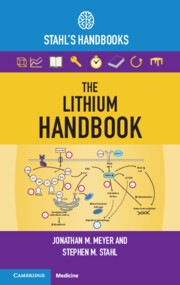Book contents
- The Lithium Handbook
- Reviews
- The Lithium Handbook
- Copyright page
- Contents
- Foreword
- Preface: How to Use This Handbook
- Introduction
- 1 The Efficacy Story
- 2 Renal Handling of Lithium
- 3 Clinical Pharmacokinetics
- 4 Lithium Initiation and Monitoring
- 5 Management of Routine Lithium Related Adverse Effects
- 6 Lithium Toxicity
- 7 Special Populations and Circumstances
- 8 Lithium Discontinuation
- Index
- References
6 - Lithium Toxicity
Manifestations and Management of Lithium Toxicity and Overdose; Debate About Hemodialysis Implementation; Safe Use of Lithium During ECT; Clinical Situations When Lithium Should Be Temporarily Discontinued
Published online by Cambridge University Press: 09 February 2024
- The Lithium Handbook
- Reviews
- The Lithium Handbook
- Copyright page
- Contents
- Foreword
- Preface: How to Use This Handbook
- Introduction
- 1 The Efficacy Story
- 2 Renal Handling of Lithium
- 3 Clinical Pharmacokinetics
- 4 Lithium Initiation and Monitoring
- 5 Management of Routine Lithium Related Adverse Effects
- 6 Lithium Toxicity
- 7 Special Populations and Circumstances
- 8 Lithium Discontinuation
- Index
- References
Summary
Medical journals from the late nineteenth and early twentieth centuries contained descriptions of lithium toxicity derived from animal experiments, some of which resulted in fatal outcomes; however, a 1903 paper reviewed this animal and human literature extensively and noted that, when lithium carbonate was used in daily doses of 975 mg – 1300 mg as a putative gout treatment, the adverse effects were quite modest and gastrointestinal in nature [2]. Perhaps emboldened by this finding, a Michigan physician, Dr. Clarence Cleaveland, decided in 1913 to experiment on himself by ingesting 14 grams (g) of lithium chloride (equivalent to 12,380 mg of lithium carbonate) in divided doses over a period of 28 h (2 g at 1 pm, 9 pm and 7 am, then 8 g at 7 pm) and document the outcome [3].
- Type
- Chapter
- Information
- The Lithium HandbookStahl's Handbooks, pp. 329 - 361Publisher: Cambridge University PressPrint publication year: 2023

